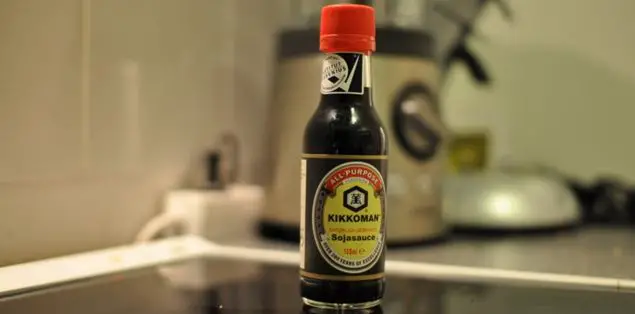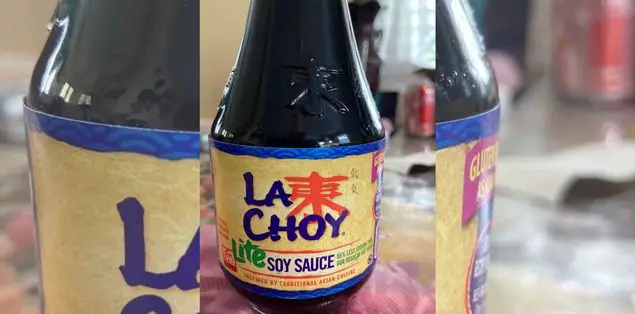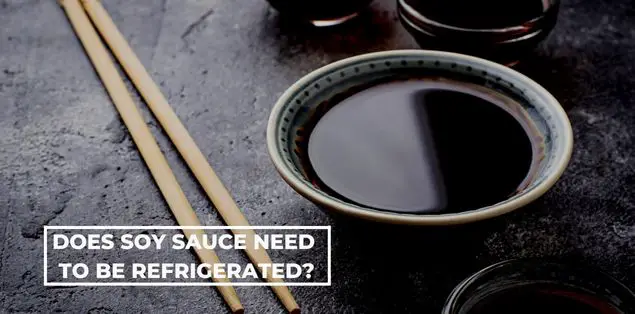Does soy sauce need to be refrigerated? Here is a simple guide to soy sauce preservation, storage stability, and spoilage. You can read it to find out how long soy sauce lasts, if you should store it in the fridge after opening, and how to detect if yours is spoiled.
You’ve had a bottle of soy sauce partially open for who knows how long and are unsure if it’s still safe to use.
Or perhaps you’ve just opened a bottle and are unsure if you should put it in the refrigerator or not. It would help if you simply had an explanation, and the package says nothing about preservation.
Sounds familiar? If so, you should read this article.
Do You Need to Refrigerate Soy Sauce?

It is not necessary to refrigerate soy sauce, but doing so has many advantages. For instance, once opened, soy sauce holds its best quality for at least a few months in the refrigerator, but only for about a month at standard temperature.
Therefore, it’s generally best to keep soy sauce in the refrigerator if you don’t use a lot of it and use it frequently.
Why Is it Essential to Refrigerate Soy Sauce?

Soy sauce doesn’t spoil, as we already mentioned in the section above, even if you don’t keep it in the refrigerator.
In the worst-case scenario, its quality and freshness will degrade more quickly, and you might find yourself needing to go to the store and buy a new bottle more frequently than you’d want.
One of its best qualities is that fermented foods like fish sauce and miso may technically be kept out at room temperature for a while without going bad. However, the meal’s resident microbes do more than only add flavor; they also aid in food preservation.
A mixture of fermented soybeans, toasted grains, brine, and a mold called kji are key ingredients in making soy sauce. The salty brown liquid brews for a longer period at room temperature during the months-long process.
Does Soy Sauce Get Spoiled if Not Refrigerated?

No, soy sauce doesn’t go bad if not stored in the refrigerator.
For instance the packets you get with food takeout, they won’t go bad at room temperature. But, with a few restrictions, it won’t deteriorate, but its flavor may diminish.
You can store soy sauce outside the refrigerator for up to one year after opening it. In fact, the bottle can remain unopened for up to two or three years. However, suppose a bottle lasts longer in your home. In that case, you should probably create room among your other condiments in the refrigerator to maintain the savory, delicious flavor of that soy sauce.
Moreover, for the finest quality preservation, reputable manufacturers like Kikkoman and La Choy advise refrigerating soy sauces after opening.
How Long Does Soy Sauce Last?
We can keep soy sauce for at least a few years after the printed expiration date on the bottle. After opening the soy sauce, it stays at its finest quality for about a month at room temperature and possibly a half year in the refrigerator. However, it lasts considerably longer and is still safe to eat.
Does Opened Kikkoman Soy Sauce Require Refrigeration?

Kikkoman Naturally Brewed Soy Sauce has a long shelf life, so people frequently question how to store the opened bottle, so the flavor stays as fresh as possible. So how long can you safely use the sauce for frying, dipping, grilling, flavoring, or enhancing the flavor of your food? We are given all the indications on the best before date on the bottle’s packaging.
We should keep the bottle in the refrigerator after being opened. By doing this, we can preserve the value of the Kikkoman Soy Sauce for a longer period feasible. The sauce darkens in color as a result of oxidation, a process that occurs in response to interaction with oxygen. To preserve the sauce’s taste and avoid oxidation, store it in a low-temperature setting.
Soy sauce won’t deteriorate “as long as no water or other components have been added,” according to the Kikkoman website. That means keeping it tight keeps it from turning bad in most cases. So you have a decision to make if you notice that this sauce’s flavor or aroma starts to change somewhat.
Does La Choy Soy Sauce Require Refrigeration?

La Choy Soy Sauce is a crucial all-purpose sauce that gives a range of meals an Asian taste. It can be used as a quick, tasty ingredient to a stir-fry or as a garnish on cereal.
No, an opened bottle of La Choy soy sauce does not need to be refrigerated. An open La Choy Soy sauce that is held in the refrigerator for at least two years will often maintain its highest quality.
How to Preserve Soy Sauce at Standard Temperature?
There is a need to keep the soy sauce out of the heat and direct sunlight, just like coffee beans and olive oil. Instead of nestling next to your stovetop or on the window sill, where light and heat will quickly deteriorate its value, choose a cold, dark cupboard. And if you accidentally purchase a gallon jug of the substance, we advise decanting the remainder into a shorter bottle and storing it in the refrigerator.
Final Words – Does Soy Sauce Need To Be Refrigerated?
A savory condiment, we can find soy sauce in many different foods and cuisines.
We can make it using either chemical hydrolysis or spontaneous fermentation. Each production technique results in various flavors and health characteristics.
Consuming soy sauce carries some potential health hazards. However, consuming naturally fermented condiments will help you avoid the worst of them, linking to variations created using chemicals.
More studies are required to determine whether the health advantages of soy sauce also apply to people. Overall, we can consume soy sauce in moderation as part of a balanced diet, much like most other foods.
